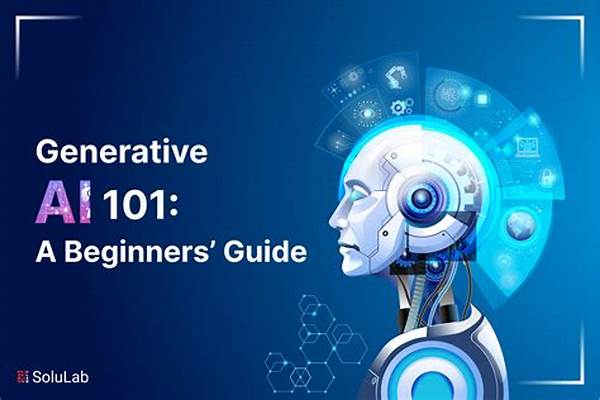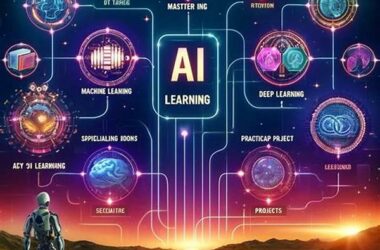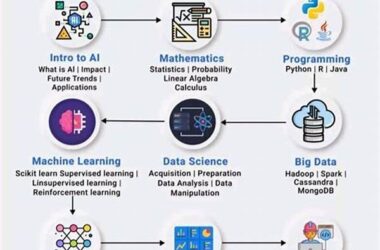Artificial Intelligence (AI) is no longer just a concept from science fiction movies; it is a transformative technology that is reshaping industries and redefining the way we live. For those new to this field, known as AI beginners, the possibilities that AI presents are both exciting and overwhelming. AI beginner enthusiasts often find themselves standing on the edge of a vast landscape filled with opportunities to innovate, learn, and develop groundbreaking solutions. This article aims to guide AI beginners in understanding the principles of AI, its applications, and how to start their journey in a way that is both fun and educational.
Read More : Is The Free Tier Enough? The Unexpected Limits Of Basic Ai Services Revealed!
The allure of AI lies in its potential to solve complex problems that were once thought to be the domain of human intellect alone. From personal assistants like Siri and Alexa to self-driving cars and intelligent machinery in factories, AI is everywhere. This universal presence of AI can be intimidating for beginners, but it also serves as an inspiration to dive into this ever-evolving world. The key for AI beginners is to grasp the foundational concepts and utilize readily available resources that demystify AI.
For AI beginners, it is crucial to start with the basics, such as understanding machine learning, deep learning, and neural networks. These are the building blocks of AI that underpin many of the technologies and applications observed today. Engaging in online courses, reading up-to-date articles, and participating in AI communities can greatly help to clear the haze around these complex topics. Don’t worry if it seems challenging at first; every AI expert was once an AI beginner.
Kickstarting the AI Adventure
As an AI beginner, choosing your path wisely will determine how effectively you adapt and grow in the AI domain. Setting clear, achievable goals can be immensely beneficial. Perhaps you wish to understand AI to advance your career, or maybe you’re interested in developing AI-driven apps. Regardless of the motives, staying curious and continuously learning is essential.
In the world of AI, collaboration is key. Joining forums or local groups for AI beginners can help them learn from peers and experts in the field. Networking with other AI beginners and seasoned practitioners provides insights that go beyond textbook learning. These interactions can lead to mentorship opportunities, collaborations on projects, or even job offers. Harnessing this collective knowledge and experience can transform an AI beginner into a competent player in the AI landscape.
Exploring the Toolbox
One of the best ways for AI beginners to sharpen their skills is by experimenting with AI tools and platforms. There are numerous online resources, such as Google’s TensorFlow, PyTorch, and online AI labs, that allow beginners to dive into practical AI application development. Starting small, like creating simple chatbots or analyzing datasets, can build a solid foundation. These tools not only provide hands-on experience but also reveal the limitless potential of AI when applied creatively.
For AI beginners, mastering AI extends beyond technical skills. Understanding the ethical considerations and implications of AI technology is equally important. AI beginners should delve into discussions on AI ethics, biases, and privacy concerns. This ensures that new developments are not only innovative but also responsible and beneficial to society. Equipped with this holistic understanding, AI beginners can contribute positively to the AI community.
AI Beginner Resources: Your Ultimate Guide
Tailoring resources for AI beginners is crucial. Providing access to the best books, online courses, and forums suited for novices ensures that learners are supported right from the start. Often, these resources include interactive tutorials, community discussions, and projects that stimulate creativity and problem-solving. As an AI beginner, seeking out these resources helps bridge the gap between theoretical learning and practical application.
Overall, being an AI beginner means embarking on a journey of both awe and discovery. The path might be challenging, but with determination and the right resources, the sky’s the limit in what one can achieve. Whether it’s contributing to a cutting-edge AI project or developing a small but impactful application, the possibilities are as expansive as one’s imagination. Embrace your inner AI beginner, and let this guide serve as your trusty companion in navigating the exciting world of artificial intelligence.
—
Why You Should Start Your AI Journey as an AI Beginner
Starting as an AI beginner is an exciting choice for anyone interested in technology, offering endless opportunities for learning and growth. The field is constantly evolving, making it an intriguing domain full of potential for innovation. AI beginners are welcomed by a vibrant community ready to support newcomers in tackling challenges, overcoming obstacles, and achieving success.
AI is not just a passing trend—it’s here to stay, and it significantly influences various sectors, from healthcare to finance, education to entertainment. For AI beginners, this means plenty of room to carve out a niche that aligns with personal interests and professional goals. By immersing oneself in the world of AI, beginners set the stage for future endeavors that could revolutionize industries and impact lives on a global scale.
The journey for an AI beginner often starts with curiosity and a thirst for knowledge. The internet is brimming with resources like MOOCs, webinars, and tutorials to get started. AI beginners are encouraged to take advantage of these resources to lay a robust foundation for more advanced studies. Engaging with AI-related content can transform a simple interest into a thriving passion, fueled by breakthroughs and innovations in real-time.
Tools and Techniques for AI Beginners
AI beginners need to familiarize themselves with essential tools and techniques in artificial intelligence. Platforms like Kaggle offer datasets that allow beginners to practice data manipulation and prediction modeling. AI beginners may find intuitive software like Google’s Colab an excellent place to start as they learn programming languages like Python, which is widely used in AI for its simplicity and versatility.
AI beginners should also consider attending workshops and conferences. These events are not only educational but also provide networking opportunities with other AI enthusiasts and industry veterans. At the same time, reading about current trends and predictions in AI helps beginners keep their finger on the pulse of this rapidly changing field.
Building an AI Community
Creating or joining an AI community can be invaluable for AI beginners. These communities serve as support networks where individuals can exchange ideas, share breakthroughs, and offer constructive feedback. Being part of an AI community offers a sense of belonging and encouragement, vital for navigating the complexities of AI as a novice.
Building a career in AI starts by acknowledging one’s status as an AI beginner and taking proactive steps to evolve. This journey requires patience, perseverance, and a continual willingness to learn. Armed with the right mindset and resources, AI beginners are well-equipped to embark on this rewarding and transformational path.
—
Objectives for AI Beginners
The Thrill of AI Beginner Challenges
Embarking on a journey as an AI beginner is akin to setting sail on a sea of possibilities where the horizon constantly shifts and evolves. Challenges encountered along the way serve as invaluable lessons that shape the journey and refine the skills of AI beginners. Each obstacle is an opportunity to innovate and think outside the box.
AI beginners often face the challenge of grasping complex theories and technical jargon that initially seem insurmountable. However, with persistence, these barriers gradually diminish, revealing the intricate beauty of AI’s inner workings. Engaging with real-life problems where AI can offer solutions is a thrilling experience, filled with light-bulb moments and breakthrough discoveries.
Strategies for Overcoming AI Beginner Hurdles
A mastermind approach is effective for tackling challenges faced by AI beginners. Seeking mentorship from experienced professionals can provide guidance and mentorship often needed to surmount initial learning hurdles. Additionally, AI beginners should embrace failure as a stepping stone to success, viewing setbacks as part of the broader learning curve.
Another strategy is adopting a project-based learning approach, which allows AI beginners to learn by doing. Whether it’s developing a simple machine-learning model or creating an AI-powered chatbot, hands-on experience solidifies theoretical knowledge. This method not only makes learning more engaging but also builds a portfolio of work that showcases proficiency to future employers.
Harnessing online platforms like forums and discussion boards is another way AI beginners can find solutions and gain insight from others who have overcome similar hurdles. These spaces often operate on the guiding principle that no question is too simple, and every discussion enriches the community, collectively advancing its members.
—
Discussion on AI Beginner Opportunities
AI beginners are in a prime position to seize opportunities that could shape the trajectory of their careers and personal growth. The world of AI is vast and diverse, with its reach extending into numerous sectors, offering AI beginners the chance to explore varying specializations. Whether it’s enhancing healthcare through predictive analytics, automating repetitive tasks in finance, or creating engaging AI-driven educational tools, the possibilities are immense.
The demand for AI expertise is on a steep incline, with industries eager to harness this technology’s potential to enhance efficiency and innovation. For AI beginners, this translates into a plethora of job opportunities ranging from AI research to development and deployment. Companies are actively seeking fresh minds with unique perspectives to join their teams and contribute to the novel solutions brought by AI. This demand empowers AI beginners to be selective in choosing roles that resonate with their career goals and values.
Furthermore, AI beginners have the distinct advantage of working at the forefront of technological advancement, witnessing firsthand how their contributions can ripple through industries and society. This unique position encourages a culture of continuous learning, ensuring that skills remain relevant amid rapidly evolving technological landscapes. AI beginners should aspire to foster creativity and curiosity, continually challenging the status quo and pushing boundaries.
AI Beginner Tools and Techniques
AI beginners have access to a suite of tools designed to provide practical experience and deepen understanding of AI processes. Open-source platforms like TensorFlow and PyTorch are ideal starting points, offering extensive libraries and communities for support. Experimenting with these tools allows AI beginners to practice designing and implementing algorithms, further anchoring theoretical knowledge with hands-on application.
Cloud-based services such as Microsoft’s Azure or Amazon’s AWS provide accessible and scalable platforms for beginners to test and develop AI models. These tools eliminate the need for expensive hardware, allowing beginners to focus on skill-building and experimentation. By actively engaging with these resources, AI beginners lay the groundwork for a comprehensive understanding of AI technology and its applications.
Furthermore, AI beginners should endeavor to comprehend the ethical implications of their work, recognizing the broader societal impacts and striving to use AI responsibly. Discussions around fairness, transparency, and accountability are crucial as AI continues to integrate into all facets of life. By adopting a conscientious approach, AI beginners can contribute to the creation of ethical AI solutions that benefit all users.
—
Illustrations for AI Beginners
Captivating the AI Beginner Mind
A key aspect of learning as an AI beginner is finding ways to capture the imagination and reduce the intimidation factor associated with this complex domain. Innovative teaching techniques and interactive demonstrations can transform challenging content into engaging and accessible material. Humor, creativity, and storytelling are invaluable tools that teachers and mentors can use to sustain interest and motivation.
Building confidence is crucial for AI beginners; as such, developing an environment where failures are seen as learning experiences rather than roadblocks is essential. Illustrations and visual aids play an important role in this process, offering AI beginners a tangible framework to grasp abstract concepts. They simplify complex ideas, making them digestible and easier to work with.
Interactive lessons, gamified learning platforms, and AI simulators can simulate real-world scenarios, allowing AI beginners to internalize and apply theoretical knowledge effectively. By integrating these elements into educational content, we create a stimulating learning journey that turns AI beginners into skilled practitioners. This not only enhances individual learning experiences but also inspires a sense of belonging within the AI community.
—
AI Beginner: Seeking Knowledge and Growth
Starting a journey in AI as a beginner is both a challenging and rewarding experience. The rapid growth of AI technology offers countless avenues for exploration and development. AI beginners are at the cusp of a technological revolution, with the power to influence and innovate profoundly. Building a solid foundation in AI principles and techniques is the first step toward realizing this potential.
AI beginners are encouraged to cultivate a mindset of lifelong learning, embracing new skills and perspectives with enthusiasm. Leveraging online courses, tutorials, and community forums provide diverse opportunities to gain mastery over AI concepts and applications. Sustaining this thirst for knowledge ensures that beginners can successfully adapt to future advancements and opportunities within the AI realm.
At the heart of AI development lies creativity, an attribute AI beginners must nurture. This creativity catalyzes the design of unique solutions and the generation of inventive applications for AI technologies. By adopting a creative and open approach, AI beginners will be well-prepared to tackle complex challenges and forge their path in the AI landscape.
Building a Network of AI Enthusiasts
Connecting with other AI enthusiasts is crucial for AI beginners. Networking provides opportunities to learn from others’ experiences, share insights, and garner support through challenges. Being part of an active AI community helps create a collaborative environment where ideas are freely exchanged, and innovation thrives.
Joining local meetups, online forums, and professional organizations allows AI beginners to immerse themselves in AI discussions and debates. These interactions generate valuable feedback and foster a sense of belonging in the AI community. By building a support network, AI beginners gain a wealth of knowledge and resources that amplify their growth and development.
Maintaining Passion in the AI Journey
The journey of an AI beginner is filled with highs and lows, yet maintaining passion and curiosity is vital for long-term success. By setting realistic goals and celebrating milestones, beginners can remain motivated and focused. Participation in hackathons, AI competitions, and collaborative projects further fuels enthusiasm and inspires continuous learning.
Envisioning the impact of AI work on society and future generations serves as an additional motivator. AI beginners are not just learning a skill but becoming part of a transformative movement that will shape the future. Staying inspired by this prospect ensures that AI beginners remain diligent and committed to their learning journey, ready to embrace new challenges and opportunities.



